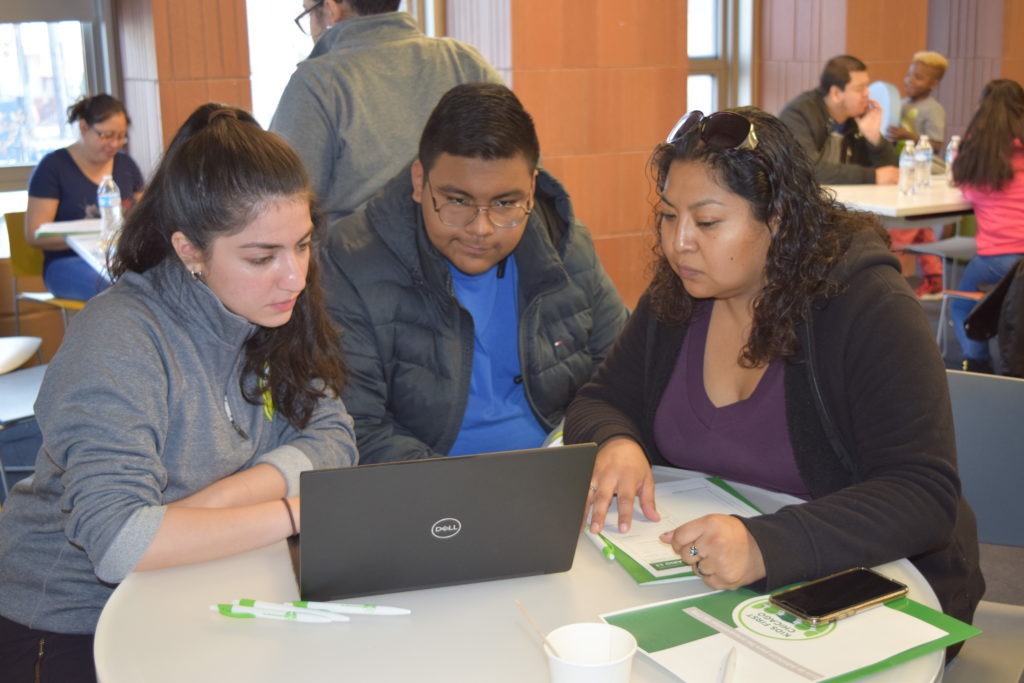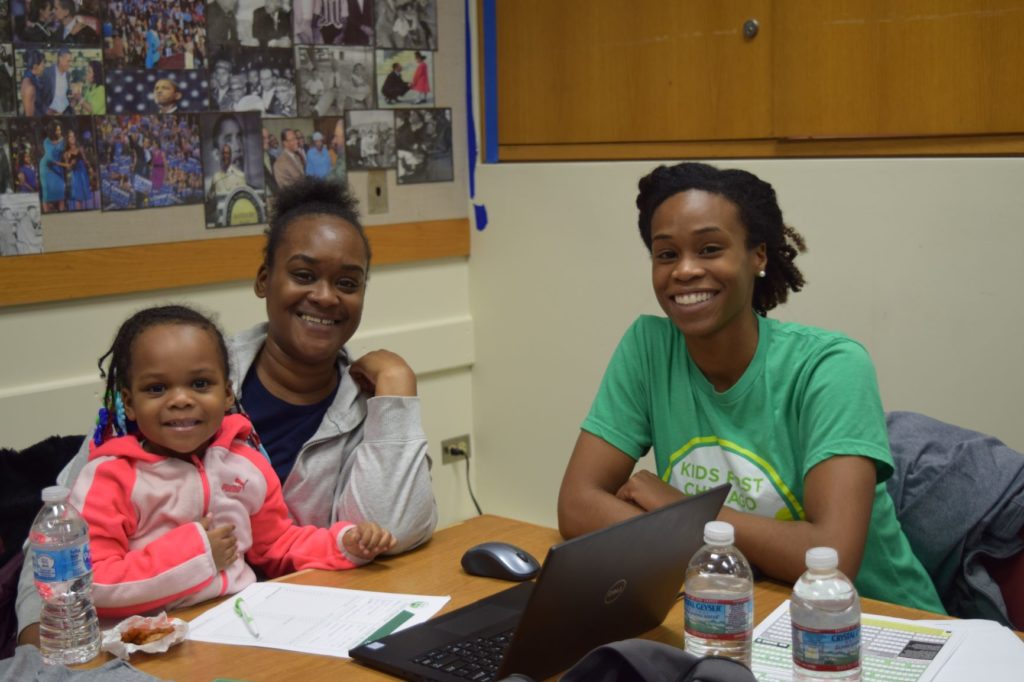In recent weeks, organizers with Kids First Chicago have held hundreds of conversations with Chicago families hit the hardest by the economic impact of efforts to control the spread of COVID-19. Three major imperatives have emerged from these conversations: meet basic needs, support families’ mental health and eliminate barriers that stand in the way of children’s education.
“No One Is Financially Prepared”
Our most vulnerable CPS families have been hard hit by cuts to their wages, furloughs, layoffs and more. Making ends meet to independently support their families’ basic needs has become nearly impossible.
- Parents described fear and shame around accessing emergency resources — concerns that are even most pronounced for undocumented Chicagoans.
- As wages dry up, families face tough decisions about paying monthly bills, including rent. Parents spoke of concerns about possible evictions and compounded rent debt.
A Back of the Yards parent shared, “No one is financially prepared. My only source of income is the child support I receive from my children’s father — it pays my rent. If he can’t work, I don’t know what I’m going to do.”
Another parent added, “I am a single mother of three daughters and currently have no income due to this Coronavirus pandemic. The only government assistance I receive is Link for food. I love working with the community and dedicate myself to helping others on a daily basis, but at this time I am in need of assistance. Because I have been off of work without pay, I currently can’t afford to provide for my children or pay my rent.”
- Parents struggle with uncertainty about access to food, toiletries, vital medications, and supplies; most households are already operating in austerity mode. Parents from the Austin community shared that families are worried about access to food and are having difficulty accessing essential items like diapers and baby wipes.
One parent shared, “I’m caring for a lot of kids; I’m specifically worried about food.”
A Humboldt Park parent stated, “My house was not ready to feed four kids and myself three times a day. I was able to get some things, but the amount of food I need to provide for my family gives me anxiety.”
Families express concern about access to credible and quality information. Their concerns not only point to the vast digital divide, but raise the question of whether digital access must become a new civil right. For education, business, and more, COVID-19 has made our ability to move seamlessly from face-to-face into virtual engagement a necessity.
“We Are Very Worried”
Like all of us, the CPS families we spoke with are coping with a wide array of feelings: at once bored and simultaneously overwhelmed, panicked, fearful, isolated, and lonely. They expressed anxiety over the ever-changing guidance coming from the Federal Government and uncertainty about when this crisis will end. Parents feel additional stress over the possibility of sudden and drastic changes to their household circumstances. What’s more troubling, their children don’t know how to process what is happening — and they, as parents, can’t provide reassuring answers.
One West Side parent shared, “I have three children at home with three different sets of needs: different learning needs, different food needs, etc. The children don’t understand the situation. I’m not sure how to get them all on a schedule. I need help.”
A family of six from the Northwest Side also described constant stress: “We are preparing a list of things we are missing. Everyone is home–my husband and four kids. We are very worried about the rent and the bills coming up.”

“I Do Not Want My Kids to Fall Behind”
Chicago Public Schools remain closed until at least April 30. While some individual schools and charter networks are able to offer remote learning options, the majority of CPS families have been left on their own to continue learning. As a result, the many barriers to a quality education that already existed before COVID-19 have been compounded.
While some individual schools and charter networks are able to offer remote learning options, the majority of CPS families have been left on their own to continue learning. As a result, the many barriers to a quality education that already existed before COVID-19 have been compounded.
- As mentioned, a big source of inequity within Chicago is technology access — access to devices and high-speed internet — to enable continued learning. Truthfully, in households without access to digital resources, students likely already struggled to get homework done, communicate with teachers and classmates, and ask questions on school projects — even before this crisis hit.
- Students without access to devices or the internet — many who may have already been behind their peers — are most certainly falling further behind.
For example, one parent talked about her four kids having to use technology at home for e-learning and the challenges of only having one computer to share among them. She added, “Teachers are also giving my kids the same time to get on Zoom, which does not help because of the lack of technology [devices]. I am a teacher, but I don’t know how to teach everything and my kids are in dual-language classes, so I’m even less knowledgeable about that. It just creates a lot of tension because I do not want my kids to fall behind. I’m doing the best I can right now.”
Another parent expressed, “Chromebooks need to be made available. Luckily I was able to take my computer from work home, other parents in other schools did not, which is stressing families out. Having computers locked away in schools is a waste and should be given to the students that need them.”
- While students fall behind, grade promotions and graduation remain uncertain.
- Students with special learning accommodations and needs are especially vulnerable right now. Parents say they are simply not receiving the support that they’ve fought so hard to secure in recent years.
A parent of two diverse learners on the South Side shared, “Both of my children have autism — trying to teach them both 1-on-1 is impossible. Teachers send assignments via email, but I have limitations to how I can help them. We only have one computer and I don’t know much about technology. They need their teachers. They are missing out on education.”
- Finally, parents need guidance about remote learning, how to gain access to quality at-home learning programs and educator support, and how best to structure learning for a broad range of learners and levels.
At Kids First Chicago, we are committed to finding a pathway for the city to help address digital barriers and for CPS to build its capacity to deliver remote learning to the pockets of the city where it’s so badly needed.
If we can work together to resolve the digital divide right now, during this time of crisis, we believe we can help create a more connected, equitable city.
Daniel Anello
Latest posts by Daniel Anello (see all)
- Hundreds of CPS Families Told Kids First Chicago What They Really Need - April 6, 2020
- When Enrollment Is Declining, Let Communities Decide Next Steps for Schools - November 19, 2018
